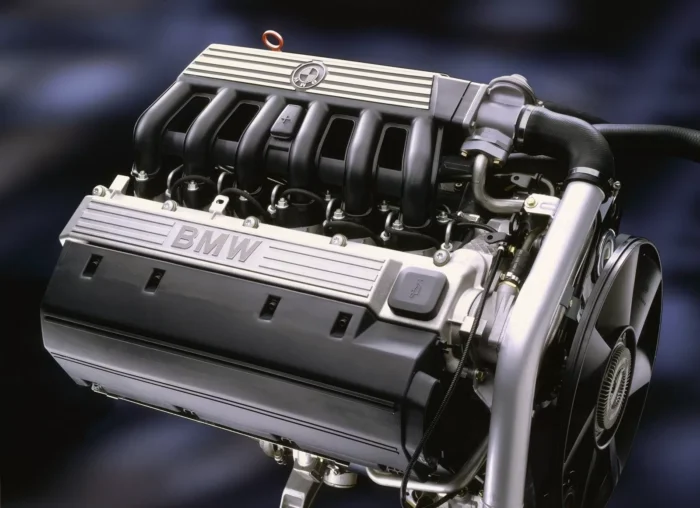The BMW M51 diesel engine saw production from 1991 to 2001 in the Austrian factory, used in a variety of popular models such as 3-Series E36, 5-Series E34, and 5-Series E39. This powerful unit received an upgrade in 1996 with its new index M51TU. On top of the 2.5 liter unit, the factory also offered an R6 range featuring other engines such as M21, M57, N57 and B57 so customers had ample options to choose from. With its long production streak it’s no surprise that this engine quickly became an automotive staple that would later inspire models with improved performance and design.
Engine specifications for BMW M51 2.5 l
Modification: M51D25 UL
| Displacement |
2497 cc |
| Power system |
vortex chamber |
| Engine power |
115 hp |
| Torque |
222 Nm |
| Cylinder block |
Cast iron R6 |
| Cylinder head |
Aluminum 12v |
| Cylinder diameter |
80 mm |
| Stroke |
82.8 mm |
| Compression ratio |
22 |
| Engine features |
No |
| Hydraulic compensators |
Yes |
| Timing Chain/Belt |
Chain |
| Variable Valve Timing (VVT) |
No |
| Turbocharger |
MHI TD04-11G-5 |
| Oil capacity/Recommended oil |
6.5 l 5W-40 |
| Fuel type |
Diesel |
| Euro class |
EURO 1/2 |
| Average lifespan |
350 000 km |
Modification: M51D25 OL
| Displacement |
2497 cc |
| Power system |
vortex chamber |
| Engine power |
143 hp |
| Torque |
260 Nm |
| Cylinder block |
Cast iron R6 |
| Cylinder head |
Aluminum 12v |
| Cylinder diameter |
80 mm |
| Stroke |
82.8 mm |
| Compression ratio |
22 |
| Engine features |
Intercooler |
| Hydraulic compensators |
Yes |
| Timing Chain/Belt |
Timing Chain |
| Variable Valve Timing (VVT) |
No |
| Turbocharger |
MHI TD04-11G-5 |
| Oil capacity/Recommended oil |
6.5 l 5W-40 |
| Fuel type |
Diesel |
| Euro class |
EURO 1/2 |
| Average lifespan |
300 000 km |
Modification: M51D25TU UL
| Displacement |
2497 cc |
| Power system |
vortex chamber |
| Engine power |
115 hp |
| Torque |
230 Nm |
| Cylinder block |
Cast iron R6 |
| Cylinder head |
Aluminum 12v |
| Cylinder diameter |
80 mm |
| Stroke |
82.8 mm |
| Compression ratio |
22 |
| Engine features |
No |
| Hydraulic compensators |
Yes |
| Timing Chain/Belt |
Chain |
| Variable Valve Timing (VVT) |
No |
| Turbocharger |
Garrett TB2514 |
| Oil capacity/Recommended oil |
7.0 l 5W-40 |
| Fuel type |
Diesel |
| Euro class |
EURO 2/3 |
| Average lifespan |
350 000 km |
Modification: M51D25TU OL
| Displacement |
2497 cc |
| Power system |
vortex chamber |
| Engine power |
143 hp |
| Torque |
280 Nm |
| Cylinder block |
Cast iron R6 |
| Cylinder head |
Aluminum 12v |
| Cylinder diameter |
80 mm |
| Stroke |
82.8 mm |
| Compression ratio |
22 |
| Engine features |
intercooler |
| Hydraulic compensators |
Yes |
| Timing Chain/Belt |
Timing Chain |
| Variable Valve Timing (VVT) |
No |
| Turbocharger |
MHI TD04-13T-4 |
| Oil capacity/Recommended oil |
7.0 l 5W-40 |
| Fuel type |
Diesel |
| Euro class |
EURO 2/3 |
| Average lifespan |
300 000 km |
The dry weight of the M51 engine is 210 kg
Fuel consumption BMW М51
The 1994 BMW 525tds with manual transmission as an example (l/100km)
| City |
11.3 l |
| Highway |
6.1 l |
| Combined |
8.0 l |
Which cars have the М51 2.5 l engine
The BMW M51 2.5 l engine is a diesel engine produced by the renowned German car manufacturer BMW. It was first debuted in its lineup of E36 3 Series cars and can be found in various other BMW models such as its 5 Series, 7 Series, and X3/X5 Crossovers. Currently, its production has been extended to the F30 3 Series, the G11 5 Series and some variants of the G31 5 Series Touring models; all of which remain some of the most sought after vehicles on the market. When seeking a reliable powertrain that combines comfort with efficiency, it’s hard to go wrong with this popular engine from BMW.

BMW
| 3-Series E36 |
1991 – 1999 |
| 5-Series E34 |
1991 – 1996 |
| 5-Series E39 |
1996 – 2000 |
| 7-Series E38 |
1996 – 2000 |
Opel
| Omega B (V94) |
1994 – 2001 |
Land Rover
| Range Rover 2 (P38A) |
1994 – 2002 |
Problems & disadvantages of the М51
The diesel engine faces several issues, including overheating leading to cylinder head cracking and stretching of the timing chain. Poor-quality oil affects the plunger pair in HPF systems, while cold start difficulties could be indicative of a faulty booster pump. Finally, after 150k miles turbocompressors often have to be replaced for peak performance.

0 Comments